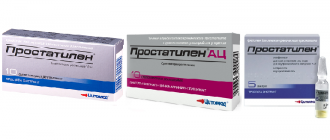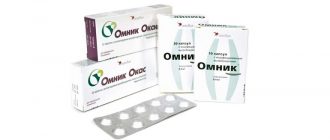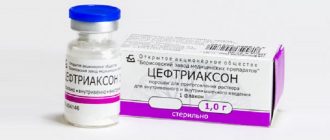Diclofenac is effective for prostatitis because it quickly relieves inflammation and relieves pain. This anti-inflammatory medicine, available in various dosage forms, does not contain hormones. The product is sold by prescription.
Release form and composition
The drug has many forms of release: tablets, gel, ointment, suppositories, solution for intramuscular injections, eye drops. In the treatment of inflammation of the prostate gland, suppositories are most often used. Tablets and injections can be used in acute forms of the disease to quickly relieve symptoms.
The main active ingredient of the drug is diclofenac sodium.
Candles
Suppositories are cylindrical in shape with a pointed end, white or with a slight yellow tint.
Diclofenac suppositories for prostatitis are available in two types: with 50 and 100 mg of active substance in each. Colloidal solution of silicon dioxide, miglyol 812 and solid fat are used as excipients.
Each suppository is packaged in a separate contour cell, connected into a blister of 5 cells. They go on sale in cardboard packs of 10 pieces.
Pills
Available in three dosages: contain 25, 50 and 100 mg of the active ingredient. Excipients: lactose, corn starch, povidone K30, sodium lauryl sulfate, sodium carboxymethyl starch, silicon dioxide solution, magnesium stearate.
Round in shape, covered with a soluble yellow coating. Packed in a blister of 10 pieces. Sold in packs of 20, 30, 100 pieces
Injections
The solution for intramuscular injection is produced in ampoules of 3 ml, at a concentration of 75 mg/ml of the active substance. Sold in cardboard boxes of 5 or 10 pieces.
pharmachologic effect
The drug belongs to the group of non-steroidal anti-inflammatory drugs. It has the property of blocking the synthesis of prostaglandins - this helps relieve pain during the inflammatory process.
Diclofenac suppositories help with prostatitis:
- relieve pain;
- eliminate the inflammatory process;
- reduce temperature;
- improve blood circulation in prostate tissues, resulting in accelerated cell regeneration.
Suppositories help to quickly relieve symptoms by directly affecting the source of inflammation. The active substance affects the source of inflammation without passing through the liver and gastrointestinal tract.
Indications
The drug is used in the treatment of various diseases:
- Musculoskeletal system (arthritis, radiculitis, osteochondrosis, rheumatism and others).
- Gynecological diseases.
- For various pain sensations (headache, dental, bone, joint, post-operative).
- In complex therapy for diseases of the ENT organs (pharyngitis, tonsillitis, otitis).
Diclofenac suppositories have indications for use in urological diseases:
- prostatitis (acute, bacterial, chronic);
- prostate adenoma.
Contraindications
Despite the use of the drug for a variety of diseases, the drug has a number of contraindications for use.
Patients are prohibited from taking the drug:
- having intolerance to components;
- disorders of the hematopoietic process;
- with aspirin asthma (NSAID intolerance);
- with exacerbation of erosive and ulcerative lesions of the gastrointestinal tract;
- suffering from proctitis.
Should be used with caution when:
- liver and kidney failure;
- anemia;
- bronchial asthma;
- diabetes mellitus;
- high blood pressure;
- systemic connective tissue diseases;
- elderly patients.
The following symptoms may appear as side effects:
- headaches and dizziness;
- disruption of the gastrointestinal tract (constipation, diarrhea, flatulence, nausea, vomiting).
When treating with the drug, you should refrain from work that requires a quick mental and motor reaction.
Instructions for use
The doctor selects the duration of administration and dosage when treating the disease individually. It all depends on the age, general condition of the patient and the presence of concomitant diseases.
The maximum dosage of Diclofenac for prostatitis should not exceed 150 mg, regardless of the dosage form used. For diseases requiring long-term use of the drug, the dose should not exceed 100 mg per day.
Candles
Instructions for the use of Diclofenac suppositories for prostatitis recommend a maximum dose of 100 mg. A single dose of 100 mg is acceptable, or a divided dose is 2 pieces of 50 mg in the morning and evening. The course of treatment is maximum 7 days.
It is advisable to use suppositories after bowel movements. After administration, you must maintain a supine position for approximately 30 minutes. During this time, the suppository will completely dissolve, which will allow the medicine to penetrate into the site of inflammation.
When using Diclofenac suppositories for chronic prostatitis, it is possible to increase the dose to 150 mg.
Pills
Diclofenac tablets for prostatitis are used as a last resort, as they have a negative effect on the gastrointestinal tract and liver.
Taking tablets is recommended if the use of suppositories is unacceptable for any reason.
You need to take the tablets 2-3 times a day, after meals, with plenty of water. The course of treatment is 7 days.
It is not permissible to take pills on an empty stomach.
Injections
In case of acute prostatitis, Diclofenac injections may be prescribed to more quickly relieve symptoms.
Injections are given intramuscularly. The dosage is 100 mg per day, in case of acute inflammation it can be increased to 150. Injections are given every day for a week.
Analogs
The drug can be replaced with medications with the same active ingredient:
- Voltaren.
- Diklak.
- Naklofen.
- Dikloberl.
Or medications of the same drug group:
- Ibuprofen.
- Indomethacin.



